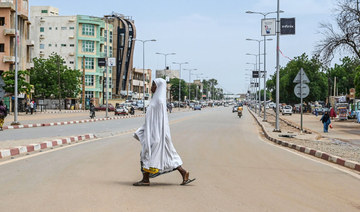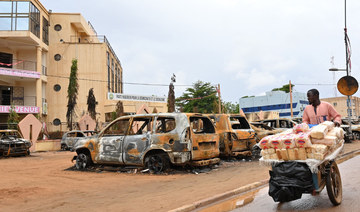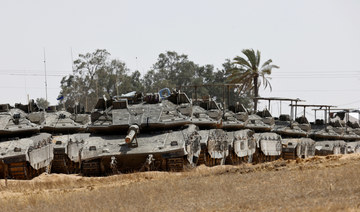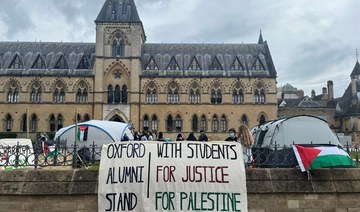NIAMEY: Niger’s new military rulers on Wednesday accused France, the country’s traditional ally, of having released captured militants and breaching a ban on air space on the eve of a key summit on the Sahel’s latest crisis.
Leaders of the West African bloc ECOWAS are to meet in the Nigerian capital Abuja to mull their options, with diplomacy apparently edging out military intervention at present after a showdown last weekend.
Two weeks after a coup that toppled Niger’s elected president, the regime accused France of having “unilaterally freed captured terrorists” — a term for extremists conducting a bloody eight-year-old insurgency.
The extremists then gathered to plan an attack on “military positions in the tri-border area,” a hotspot region where the frontiers of Niger, Burkina Faso and Mali converge, according to the statement issued by the coup leaders, called the National Council for the Safeguard of the Homeland (CNSP).
“Events of an extreme gravity are unfolding in Niger as a result of the behavior of the French forces and their accomplices,” it declared.
It urged the security forces to “raise their alert level across the country” and on the public “to remain mobilized and vigilant.”
The regime also accused France of having flown a “military plane” from neighboring Chad into Niger air space on Wednesday, defying a ban imposed on Sunday.
The two allegations were rejected by a French government official.
“No terrorist has been freed by French forces,” the source said, adding that the flight had been “authorized by and coordinated with” Niger’s armed forces.
Thursday’s summit of the Economic Community of West African States (ECOWAS) takes place under the chairmanship of Nigeria, the regional superpower and advocate of a hard line against the coup.
Struggling to stem a cascade of putsches among its members, the bloc gave Niger’s military rulers until last Sunday to reinstate President Mohamed Bazoum or face potential use of force.
But the coup leaders remained defiant, and the ultimatum passed without action.
On Tuesday, a bid to send a joint team of ECOWAS, UN and African Union (AU) representatives to the capital Niamey ran into the ground.
The coup leaders said they could not guarantee the mission’s “safety” in the light of what they said was public anger to sanctions imposed by ECOWAS.
Despite the failure, ECOWAS and Nigeria said they would pursue all options to resolve the crisis, and the United States emphasised a “peaceful” outcome even though it too had been rebuffed.
ECOWAS said it would “continue to deploy all measures in order to restore constitutional order” in Niger.
Nigerian President Bola Tinubu said through his spokesman that “no options have been taken off of the table” but diplomacy was the “best way forward.”
The United States sent veteran envoy Victoria Nuland to Niamey on Monday, but she came away empty-handed, being unable to meet Bazoum or even the new strongman, General Abdourahamane Tiani.
Despite this, US Secretary of State Antony Blinken said Wednesday he had spoken to Bazoum “to express our continued efforts to find a peaceful resolution” to the “current constitutional crisis.”
France, which had adopted a combative tone as the ECOWAS ultimatum loomed, also signalled a softer line.
A French diplomat said it was “up to ECOWAS to take a decision, of whatever kind, on restoring constitutional order in Niger.”
Bazoum, 63, was detained on July 26 by members of his presidential guard.
It is the fifth coup in Niger’s history since independence from France in 1960 — and the fourth in the ranks of the 15-nation ECOWAS since 2020.
Bazoum’s election in 2021 had helped Niger to cement close ties with France and the United States, which have major bases and troop deployments in the country.
Countries in the fragile Sahel are battling with an extremist insurgency that erupted in northern Mali in 2012, spread to Niger and Burkina Faso in 2015 and now is causing jitters in states on the Gulf of Guinea.
The bloody campaign has been devastating for those three countries, which have a long history of turbulence and are among the poorest nations in the world.
Since their coups, Mali and Burkina Faso have fallen out with France, the region’s former colonial power and its traditional ally.
France last year withdrew its forces from those countries and refocussed its anti-extremist strategy on Niger.
Mali and Burkina Faso have voiced solidarity with their counterparts in Niger, saying that any ECOWAS military intervention would be considered a “declaration of war” against them.
Niger coup leaders take aim at France on eve of key summit
https://arab.news/5nz88
Niger coup leaders take aim at France on eve of key summit
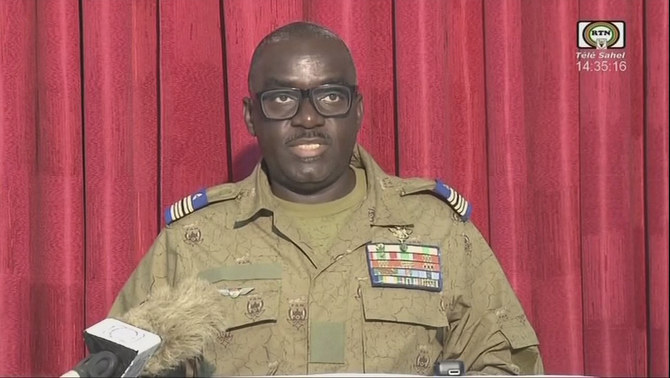
- The regime also accused France of having flown a “military plane” from neighboring Chad into Niger air space on Wednesday, defying a ban imposed on Sunday.
Ground invasion of Rafah would be ‘intolerable,’ UN chief warns

- Israel has killed more than 34,700 Palestinians, around two-thirds of them children and women, according to Gaza health officials
UNITED NATIONS, United States: A ground invasion of Rafah would be “intolerable,” UN Secretary-General Antonio Guterres said Monday, calling on Israel and Hamas “to go an extra mile” to reach a ceasefire deal.
“This is an opportunity that cannot be missed, and a ground invasion in Rafah would be intolerable because of its devastating humanitarian consequences, and because of its destabilizing impact in the region,” Guterres said as he received Italian President Sergio Mattarella.
UK military personnel’s data accessed in hack, BBC reports

- MPs could be informed about the development in the Commons on Tuesday
Some personal information in a payroll system used by Britain’s defense department has been accessed in a data breach, the BBC reported on Monday.
The system was managed by an external contractor and no operational Ministry of Defense data was obtained, the broadcaster said, adding that the department took the system off-line immediately.
Information like names and bank details of current and some former members of the Royal Navy, Army and Air Force was compromised, according to the report.
The Ministry of Defense did not immediately respond to a Reuters’ request for comment outside working hours.
MPs could be informed about the development in the Commons on Tuesday, the report added.
Russia says it takes control of two more settlements in eastern Ukraine
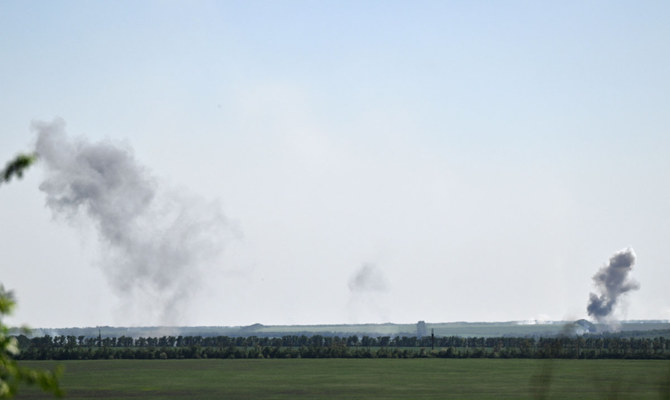
- Russia has made slow but steady advances since taking Avdiivka in February, with a string of villages in the area falling to Moscow’s forces
MOSCOW: Russian forces have taken control of the settlements of Soloviove in Ukraine’s eastern Donetsk region and Kotliarivka further north in the Kharkiv region, the defense ministry said on Monday.
Ukraine’s military made no mention of either locality in its evening General Staff report. Kharkiv Regional Governor Oleh Syniehubov said on Monday that Kotliarivka, located near the town of Kupiansk, was one of several locations to come under Russian shelling.
But Ukrainian bloggers appeared to acknowledge that both villages were in Russian hands.
DeepState, a popular forum on the war, noted on Saturday that Kotliarivka had been captured by Russian forces and on Sunday said the neighboring village of Kyslivka was also in Russian hands.
DeepState reported that Soloviove, northwest of the Russian-held town of Avdiivka, had been taken by Russian forces last week.
Russia has made slow but steady advances since taking Avdiivka in February, with a string of villages in the area falling to Moscow’s forces.
UNICEF warns 600,000 children face ‘catastrophe’ in Rafah
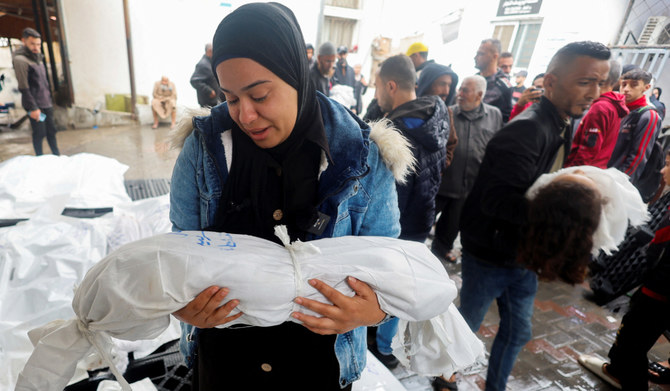
- Calling again for a ceasefire and safe access for humanitarian organizations, the agency highlighted there are some 78,000 infants under age two sheltering in the city, along with 175,000 children under five who are affected by infectious disease
- Israel has killed more than 34,000 Palestinians in Gaza, mostly women and children, according to the health ministry in the Hamas-run territory
NEW YORK: Some 600,000 children packed into Gaza’s Rafah city face “further catastrophe,” UNICEF warned on Monday, urging against their forced relocation after Israel ordered an evacuation ahead of its long-threatened ground invasion.
“Given the high concentration of children in Rafah ... UNICEF is warning of a further catastrophe for children, with military operations resulting in very high civilian casualties and the few remaining basic services and infrastructure they need to survive being totally destroyed,” the UN children’s agency said in a statement.
It said Gaza’s youth were already “on the edge of survival,” with many in Rafah — where the agency said the population has soared to 1.2 million people, half of them children — already displaced multiple times and with nowhere else to go.
“More than 200 days of war have taken an unimaginable toll on the lives of children,” said UNICEF Executive Director Catherine Russell.
“Rafah is now a city of children, who have nowhere safe to go in Gaza,” she said, warning that a large-scale military operation by Israel would bring “chaos and panic, and at a time where (children’s) physical and mental states are already weakened.”
UNICEF estimates that Rafah’s population has swelled to nearly five times its normal figure of 250,000 residents.
Calling again for a ceasefire and safe access for humanitarian organizations, the agency highlighted there are some 78,000 infants under age two sheltering in the city, along with 175,000 children under five who are affected by infectious disease.
Gaza’s bloodiest-ever war began following Hamas’s unprecedented Oct. 7 attack on Israel.
Israel has conducted a retaliatory offensive that has killed at least 34,735 people in Gaza, according to the Hamas-run
territory’s Health Ministry.
Of that toll, more than 14,000 are children, the ministry has said.
Israeli Prime Minister Benjamin Netanyahu has vowed to send ground troops into Rafah regardless of any truce, despite concerns from the US, other countries, and aid groups.
Hamas official Izzat Al-Rashiq said in a statement that any Israeli operation in Rafah would put the truce talks in jeopardy.
Senior Hamas official Sami Abu Zuhri said the evacuation order was a “dangerous escalation” that would have consequences.
“The US administration, alongside the occupation, bears responsibility for this terrorism,” the official said.
Hamas said later in a statement that any offensive in Rafah would not be a “picnic” for Israeli forces and said it was fully prepared to defend Palestinians there.
Aid agencies have warned that the evacuation order will lead to an even worse humanitarian disaster in the crowded coastal enclave of 2.3 million people reeling from seven months of war.
“Forcing 1 million displaced Palestinians from Rafah to evacuate without a safe destination is not only unlawful but would lead to catastrophic consequences,” British charity ActionAid said.
Nick Maynard, a British surgeon trying to leave Gaza on Monday, said in a voice message from the Gaza side of the Rafah crossing into Egypt: “Two huge bombs have just gone off immediately outside the crossing. There’s a lot of gunfire as well about 100 meters from us. We are very unclear whether we will get out.”
“Driving through Rafah, the tension was palpable with people evacuating as rapidly as they could.”
Witnesses said the areas in and around Rafah where Israel wants to move people are already crowded with little room for more tents.
“The biggest genocide, the biggest catastrophe, will take place in Rafah. I call on the whole Arab world to interfere for a ceasefire — let them interfere and save us from what we are in,” said Aminah Adwan, a displaced Palestinian.
Israel has been threatening to launch incursions in Rafah, which it says harbors thousands of Hamas fighters and potentially dozens of hostages.
Victory is impossible without taking Rafah, it says.
New York’s Columbia University cancels graduation ceremony as students remain defiant

- Pro-Palestinian protests put paid to event planned for May 15
NEW YORK: New York’s prestigious Columbia University has announced that it is canceling its main graduation ceremony, scheduled for next week, because of ongoing pro-Palestinian protests.
The announcement on Monday is the latest development in a movement that began nearly three weeks ago at Columbia and has swept college campuses nationwide.
The graduation ceremony had been scheduled for May 15 on the south lawn of the Manhattan campus, where protest encampments had been based before authorities dismantled them last week.
The Ivy League institution said it would “forego the university-wide ceremony” and hold a series of smaller events instead.
“We are determined to give our students the celebration they deserve, and that they want,” Columbia announced, saying “smaller-scale, school-based celebrations are most meaningful to them and their families.”
The university added: “We will focus our resources on those school ceremonies and on keeping them safe, respectful, and running smoothly. A great deal of effort is already underway to reach that goal.”
Students across the US have protested and set up tents at dozens of universities to register their opposition to the war in Gaza, while calling on President Joe Biden to do more to stop the bloodshed.
They have also demanded their institutions cease supporting companies that support Israel’s government.
Maya James, a psychology student at Columbia, told Arab News: “Seeing the university’s really insane response to student protests has brought so many people together, because I feel like most people on this campus can agree, including faculty, that students should not be penalized for expressing their First Amendment rights to protest, to petition, to do all of these things we’ve been encouraged to do for so long.”
She called on the university to give amnesty to students who had been suspended for expressing their First Amendment rights, which protect freedom of speech, the press, assembly, and the right to petition.
James also called on the university to disclose its investments because as “of right now there’s no visibility for us students to be able to know what the university is expected to do.”
She described the “vibes” at the protest sites as “absolutely remarkable,” with cultural and educational programs being offered and all kinds of activities being held.
She said the demonstrations were a continuation of Columbia’s long tradition of protest which began in the 1960s with its opposition to the involvement of the US in the Vietnam War.
James said it was “incredible” to see the solidarity for the Palestinian cause spread in campuses across the US, and people pushing to ensure “that we do indeed see a free Palestine within our lifetime and that our universities are no longer complicit in the genocide.”
Demonstrators have gathered on at least 40 US university campuses since April 17, often erecting tent camps to protest against the soaring death toll in the Gaza Strip. Nearly 2,000 people have been detained, according to the US media.
Police officers have forcibly ended several student sit-ins in recent days, including one at New York University at the request of its administrators.
Demonstrators had barricaded themselves inside Columbia, the epicenter of student protests in New York, and some complained about police brutality when officers cleared the faculty.
(With Agencies)



